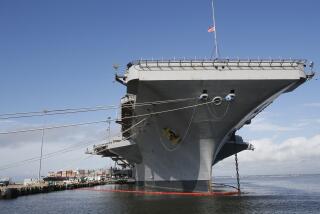Rohrabacher Tells of GAO Report Backing Naval Station : Military: The congressman says the report arguing against closure of the base was ignored by the Navy and withheld from a presidential commission.
- Share via
A report by congressional auditors recommending that it would be unwise to shut down the Long Beach Naval Station and several other bases was ignored by the Navy and withheld from a presidential commission, according to an area congressman who has been battling to keep the Long Beach base open.
Rep. Dana Rohrabacher (R-Long Beach) said last week that his staff struck “a gold nugget” when it obtained a copy of a still-unreleased, 50-plus page report authored by the General Accounting Office. The report recommends that the Navy leave existing bases alone and, instead, shut down six new strategic home ports, five of which are still under construction, the congressman says.
Rohrabacher said the GAO report was forwarded to the Navy on March 13, one month before Long Beach and 30 other major military bases were marked for closure, a move that local officials say will damage the city’s economy and destroy its Navy-friendly image.
Rohrabacher declined to release the report until it is reviewed by the Defense Base Closure and Realignment Commission, an independent body appointed by President Bush to review the proposed closures. Rohrabacher informed the commission of the report’s existence in a letter on Thursday.
“The Navy has thumbed its nose at instructions it was given on how to make its decision,” Rohrabacher charged. “This report is another piece of the puzzle, and when you put the pieces all together, the Navy doesn’t look very good.”
The Navy’s decision to go ahead with construction of strategic home ports in six coastal cities has been a point of debate in Washington for months in light of changing world conditions and a shrinking defense budget.
The GAO recommended in another report in April, 1990, that the Navy suspend construction of the new ports, which would cost an estimated $1.4 billion to complete. The ports are to be built at Pascagoula, Miss.; Pensacola, Fla.; Everett, Wash.; Corpus Christi, Tex.; and Mobile, Ala., Rohrabacher said. Only the one in Staten Island, N.Y., is finished.
Lt. Mark Walker, a Navy spokesman in Washington, said the Navy evaluated the new home ports along with all the others. When considering the ability to perform a mission, age, cost and quality of life for sailors stationed there, the new home ports “scored very high.”
“These are modern, efficient facilities . . . designed to (accommodate) modern, deep-draft, power-intensive ships,” Walker said.
The base-closure commission recently threatened to throw out the Pentagon’s hit list unless the Navy adequately documented its reasons for targeting Long Beach and other bases for closure. The commission is scheduled to submit a final list to President Bush on July 1.
A final draft of the GAO report has been withheld from Congress pending a response from the Navy, which Rohrabacher charged is “dragging its feet” to conceal critical information and keep its new ports off the hit list.
The Navy submitted its response to the Department of Defense April 26, Walker said, suggesting that the Navy was not responsible for any delay.
Rohrabacher accused the Navy of using a “highly subjective” formula to justify a financially foolish desire to build its new ports.
“I think we have some very senior officers whose careers have been put on the line on this issue of building home ports,” Rohrabacher said. “The information in this report is too important to leave out of the debate.”
The Navy would not discuss the contents of the report.
BACKGROUND
The Pentagon, citing a shrinking military force and defense budget, last April proposed shutting down 11 California military bases, including the Long Beach Naval Station. Area government and business leaders have been doing battle with the Department of Defense ever since, challenging the Navy’s logic and lobbying to keep alive the 49-year-old station that made Long Beach a Navy town.
More to Read
Get the L.A. Times Politics newsletter
Deeply reported insights into legislation, politics and policy from Sacramento, Washington and beyond. In your inbox twice per week.
You may occasionally receive promotional content from the Los Angeles Times.









